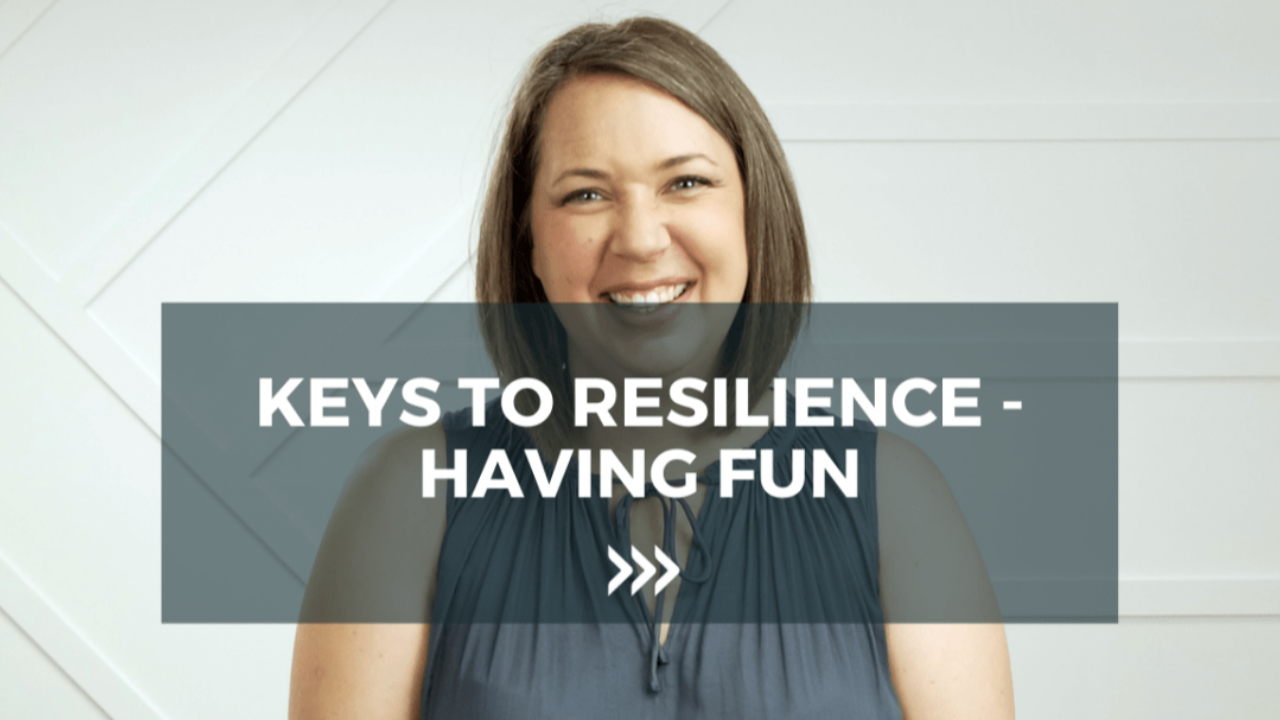KEY TO RESILIENCE – HAVING FUN
Jun 20, 2023
Having fun is often overlooked as a means to build resilience. In 2020 it was among my top 3 recommendations for people when asked how to manage stress. (ps: The other two were rest and stay connected)
Having fun is a forgotten skill that I myself have struggled with. I want to encourage you that even though your version of fun may look different than others, it’s important to do activities that bring you joy and pleasure.
In this series on Resilience, I want to take time to reflect on all 7 Keys to Resilience. In this post, we are going to focus on the key of having fun.
Having fun as an adult can feel hard.
As a kid or teen, it was easy. There were organized groups, activities, lessons, and very few responsibilities. There was always something to do. But as an adult or parent with significant responsibilities and pressures, it’s WAY harder to find fun and/or make time for fun.
When my husband and I were first married, we thought of putting out an advertisement looking for nice, normal friends in their early twenties. This was clearly a bad idea. So instead, we joined a recreational volleyball league and met some great people that we are still friends with 15 years later. This was way outside of my comfort zone but my husband was eager.
Having fun became harder with young kids in the mix. Even more so when the demands and responsibilities of having a career increased. It can be easy to consider having fun as a luxury that you can’t afford, or as something that sits at the bottom of your list of priorities.
In our busy and driven culture, we can sometimes feel as though everything we do should get us closer to meeting a goal or achievement. Consequently, play or fun can feel counterintuitive because it doesn’t outwardly appear to achieve anything. There is no purpose except for the genuine joy that it brings.
Play triggers the release of endorphins, the body’s natural feel-good chemicals, which relieves stress and can even temporarily relieve pain.
Pursuing other fun activities that challenge the brain can help prevent memory issues and enhance brain function. The social interaction of playing with family and friends can also help ward off stress and improve your relationships.
PSALMS 118:24 SAYS “THIS IS THE DAY THAT THE LORD HAS MADE; LET US REJOICE AND BE GLAD IN IT.”
We are encouraged to find joy in the day right in front of us, not because we accomplished something but because joy is a gift from God.
We can often put off having fun until we have time off or extra money, but fun doesn’t have to be big. It doesn’t require extravagant things like vacations or amusement parks.
This past year we were stripped of all the large activities we would have normally classified as being fun. Vacations, parties, malls, sports and movie theatres. It forced us to be creative in our fun: hiking, puzzles, make your own sundaes, movie nights, reading, or even, for those of you who love it, Lego.
ONCE AGAIN RESEARCH HAS CONFIRMED WHAT IS FOUND IN SCRIPTURE, THAT HAVING FUN IS A KEY TO RESILIENCE.
Having fun allows you the mental and emotional break to be creative and relieve stress. This will prevent you from getting stuck when walking through life’s difficult moments.
Having simple regular moments of fun will help prevent depression and improve your resistance to disease. Or as it says in Ecclesiastes 8:15, “And I commend joy …. for this will go with him in his toil through the days of his life that God has given him under the sun.”
For years I struggled with fun because what I think is fun is not typical. I’m pretty much a senior at 40. I like puzzles, reading, walking, playing the piano, and chatting with girlfriends over good food.
So many of my friends love crafting, exercise, and decorating. Or my husband; snowmobiling, motorcycles, and boating.
But I discovered that what is fun for you is perfect. There is no need to compare or evaluate or shift your fun to match others. Only what is truly fun for you will give you the benefits of joy and resilience.
When supporting others it’s amazing the relief that can happen when they are encouraged to have fun. They are shocked that you aren’t giving them tasks and homework to complete in order to overcome their circumstances. Having fun is powerful. Both for you as a caregiver and for those whom you’re supporting.
A great question to ask yourself, or those who you’re supporting, is “what did you do for fun as a kid?” Was it biking? Sewing? Music? Making forts? And then do that. Fun doesn’t require days off work or extra money. It’s simple and builds your resilience.
If you would like to hear about the other 6 Keys to Resilience, check out the hopemadestrong.org/blog.

